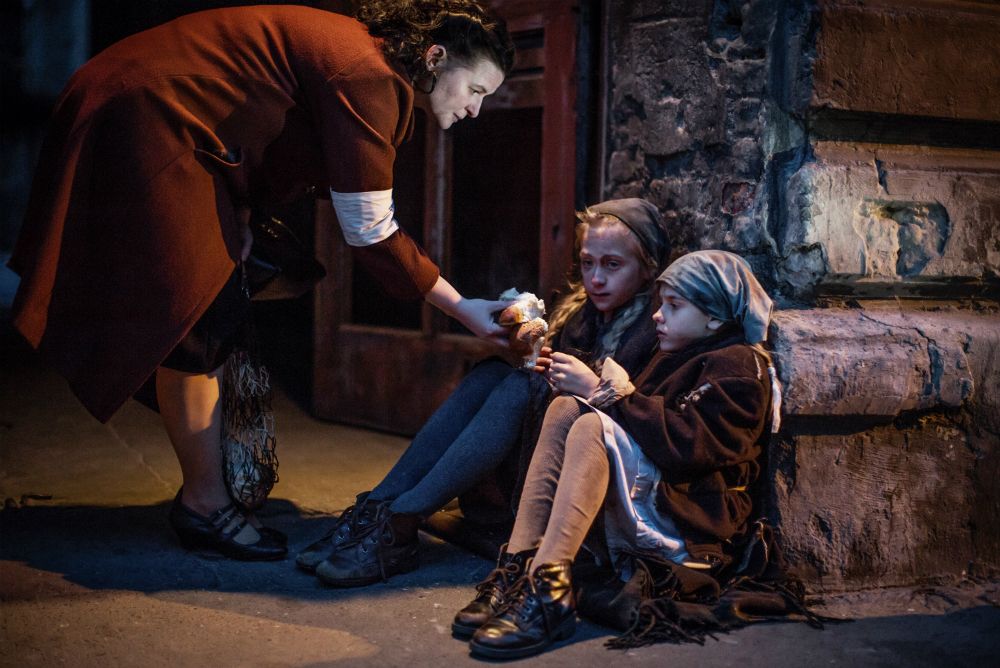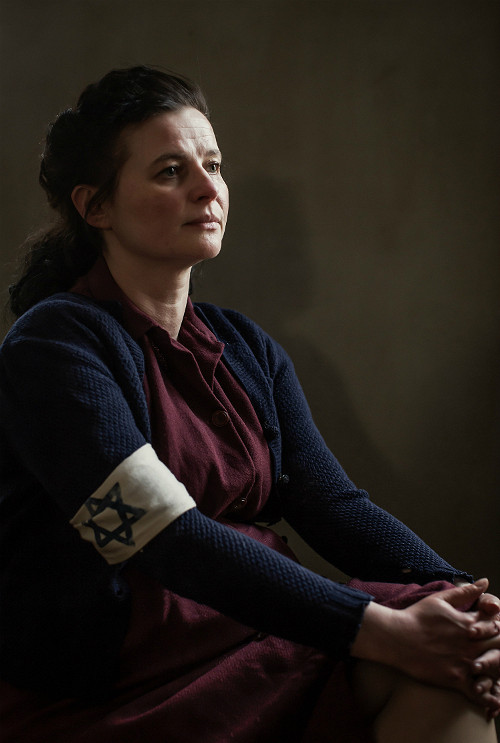- News
- Events
- Oneg Shabbat
- Collections
- Research
- Exhibitions
- Education
- Publishing Department
- Genealogy
- About the Institute
- Bookstore


My first encounter with Rachela Auerbach took place soon before the filming of Roberta Grossman’s „Who Will Write Our History” began. I’ve never heard of her before, even though she was from Warsaw, like me. I didn’t know anything about the Ringelblum Archive or the Oneg Shabbat group either.
During the casting call, I was supposed to read a fragment of Rachela’s writings. It has left me in shock. I couldn’t stop thinking about it. I’ve felt personally moved by it, perhaps thanks to the form even more than the content. Its directness makes Rachela’s writing appear to be devoid of emotions, but at the same time, it touches a raw nerve in the reader or listener.
Before every casting, I’m preparing as thoroughly as I can, so I’ve read everything about Rachela that I could find online. I managed to find excerpts from her account from an on-site verification to the former Treblinka extermination camp. All of this has contributed to a complete image of her and made me dream about playing her role. It became something more than an acting adventure. I had a feeling that this film can be really important and moving. When I’ve found out that I won the casting and I will play Rachela, I had more time to learn about Emanuel Ringelblum, the Oneg Shabbat group, and making of the Archive. I found out how much these people risked and how much they sacrificed to complete this testimony.
Before the filming, I’ve been reading „Writings from the Warsaw Ghetto”, edited by dr Karolina Szymaniak. Aside from editorial work, she also explained the background of the entire story. Thanks to this, the character of Rachela Auerbach had fully developed. She became very close to me, both for artistic reason – I’d linked my professional life with her for a long time – but also personally. I became emotionally attached to her, I had an impression that I got to know her as a woman and as an artist, that we have something in common.
Rachela’s strength, apart from the fact that she gives a testimony of the Holocaust, is the way she writes. It makes a strong, piercing impression on me. The literary form emphasises the subject.
Before filming, we’ve been trying to understand the motivation: why didn’t Rachela leave Warsaw before the war? She was planning to go to Galicia – yet nobody could have predicted how her life could have developed there. She was a middle-aged, lonely woman, who suffered an unhappy, traumatic love.
Left as a woman, abandoned by her nearly whole family – everyone apart from her brother’s wife and son had died before the war – it’s difficult to imagine someone in a more difficult situation. She was a lonely person from the start. I believe that through her involvement in the people’s kitchen and in the Archive, she brought faith and meaning back into her life. Of course, it had enormous emotional consequences and cost her a lot.
In the „Writings from the Warsaw Ghetto”, there’s a fragment in which she wrote that every day, my own father keeps dying again and again. Every day, they’re killing my own sister. They torture, persecute, shame, starve to death my mother, brother, husband, baby, only son, neighbour, my friend, my dearest friend. She didn’t treat others as strangers, she cared about their fate, but the fact is that she didn’t have a family of her own.

(…)
It may sound pompously, but telling this story has become my commitment. I believe that especially due to the film, this story will become better known internationally than in Poland. It is a paradox that the Archive, which belongs to the heritage of the memory of the world, and which is within our reach, isn’t known better. I’d especially like to recommend the permanent exhibition at the Jewish Historical Institute — „What we were unable to shout out to the world”, dedicated to the Ringelblum Archive and the Oneg Shabbat group. It brought my knowledge to a next level. The exhibition made a great impression on me and I believe everybody should see it.
Telling this story is my duty from now on. I’ve already got to know it, now it’s time for others. It’s my mission, and – I emphasise this every time – if people trapped in the Warsaw Ghetto, so often aware that they will certainly die, were unable to shout this out to the world, we must talk about it loudly. Especially that the potential of this discovery is enormous. The work done after unearthing of the Archive – it was something incredible. All the volumes of the complete edition of the Archive make such an enormous impression! I believe that everyone should learn about it, and feel compelled to see and to read...
In conversation with: Anna Majchrowska
The Emanuel Ringelblum Jewish Historical Institute, the Association of the Jewish Historical Institute of Poland and the Oneg Szabat Program are partners of the film „Who will write our history?” and the special screening which took place on 27 January 2019.
